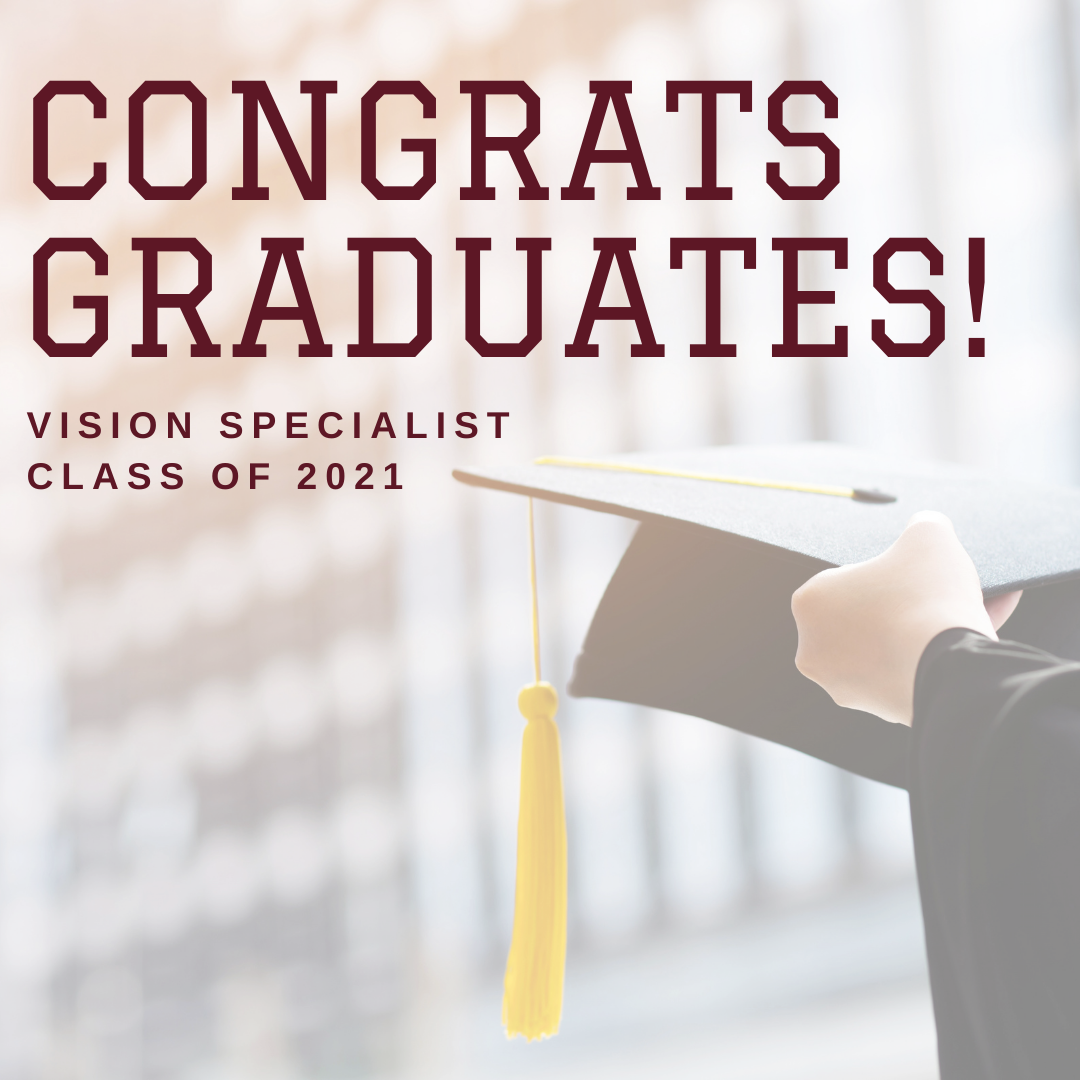NRTC Webinars and Podcasts: Employment Insights with the NRTC
The NRTC is excited about the launch of our webinars and podcasts series! This series, Employment Insights, is one of our training and technical assistance projects focused on enhancing employment outcomes for individuals who are blind or have low vision (B/LV).

For individuals who are B/LV, whether they are navigating the vocational and rehabilitation process, just beginning to consider careers, or seeking to gain or maintain employment, this project is designed to help them along their journey. Each webinar or podcast will focus on providing employment-related information to listeners.
Cantrice Moffitt, NRTC Rehabilitation Training and Outreach Specialist, led our first webinar focused on navigating the vocational rehabilitation (VR) system. With a panel of VR consumers and counselors, attendees were able to gain insight into how the process of receiving VR works and the roles of the counselor and consumer.
Our podcast series has also kicked off with two episodes focused on employment challenges, accomplishments, and insights into the employment journey. Led by host Syliva Stinson-Perez, each episode involves an interview with a person who is blind or has low vision and focuses on encouraging, inspiring, and informing people about the skills they need for employment. For more information about the webinars and podcasts and to view archived episodes, visit our webinars and podcast page.
Current Research Highlight: Increasing Labor Force Participation
Labor force participation rates among people with B/LV remain well below the rates for the general population, with approximately half of the people with B/LV out of the labor force. In other words, they are not working and have not looked for work for at least four weeks. For this NIDILRR grant research project, we are seeking new information about barriers to and facilitators of labor force participation for people with B/LV.
The purpose of this mixed-methods study is to look at current barriers to labor force participation experienced by persons with B/LV and explore strategies to overcome these barriers. This will generate information about how persons with B/LV make decisions about their employment. The effect of government policies and programs on their employment decisions will be examined, along with investigating how technology, self-employment, and mentoring might positively influence labor force participation.
Our investigation began with an analysis of existing national datasets to identify factors associated with being out of the labor force. We are currently in the process of completing this first phase of this study, which is to identify differences among people with B/LV who report being unable to work and those who are employed, unemployed, and out of the labor force for other reasons. The first phase of the study will inform the next phase of the study, which will involve exploratory interviews with individuals who are out of the labor force to investigate reasons for their lack of labor force participation.
Following the interviews, we will focus on mentoring relationships, one strategy that appears to promote labor force participation. We will survey people with B/LV who have had employment-related mentoring relationships. The ultimate goal of this project is to identify and describe factors that influence people with B/LV to leave the labor force. These findings will provide insight into strategies and practices to facilitate labor force participation. Our anticipated outcome will yield valuable data to inform policymakers and identify effective interventions to increase competitive employment among people with B/LV.
For more information about this research project, visit our research project webpage.
Training and Technical Assistance
New Online Course
We have one new course available:
Braille: What It Is, and Why It Is Important: This course describes why braille is still important for those with vision loss. It also provides an overview of how the code works, equipment used for reading and writing braille, and barriers faced by those who want to learn and use braille. (1 hour CRC, ACVREP, and NBPCB).
All courses are available through our learning management system. For more information about our courses, visit our Frequently Asked Questions page.
Updated Resources
We have updated some of our resources:
- Accessibility Resources include two documents that provide tips and guidance for making your documents, social media, and graphics more accessible. The resources are hosted on our Accessibility Resources page.
- Assistive Technology in the Workplace videos highlight employees with blindness and low vision describing and demonstrating assistive technology they use in the workplace. The videos are hosted on our NTAC-BLV website on the Assistive Technology in the Workplace page.
Putting Your Best Foot Forward Workshops
Are you interested in participating in our Putting Your Best Foot Forward (PYBFF) workshops? PYBFF is a job search skills training program for transition-age youth who are B/LV. To gain access to the curriculum, you must participate in a train-the-trainer workshop. The NRTC invites all who are interested in joining our workshops to register for our waitlist. By joining this waitlist, you will be contacted with information regarding upcoming workshops. To learn more and be added to our waitlist, visit our Putting Your Best Foot Forward course page.
Other NRTC News
Moffitt Represents NRTC at AAO Conference
Cantrice Moffitt, Rehabilitation Training and Outreach Specialist, represented the NRTC at the American Academy of Ophthalmology (AAO) 2021 Conference Expo on November 13-15 in New Orleans, Louisiana. The expo provided an interactive experience allowing ophthalmologists, vendors in the field of vision, and others to connect and learn more about new vision innovations, current ophthalmologic research, and products. Attending conferences like AAO provides the opportunity for the NRTC to increase the visibility of our research and resources. Read our news item for more information.
NRTC Welcomes New Employees
The NRTC is excited to welcome Polly Abbott as the Project Manager for the Older Individuals who are Blind Technical Assistance Center (OIB-TAC). She will utilize her knowledge of blindness rehabilitation to support the OIB-TAC in course planning, redesign of the OIB-TAC website, and training activities.
We are also pleased to announce that Tony Candela has joined our team as the Vision Specialist Program Director. Tony will lead the Rehabilitation Services Administration training grant that provides a graduate certificate program for Vision Specialists in Vocational Rehabilitation.
Lessons for Living Now Available in Spanish
When individuals begin to lose vision, they may wonder if they will be able to do the activities they used to do. Through Lessons for Living, rehabilitation professionals share information on how to safely and efficiently complete tasks. A wide range of topics are covered over 19 lessons. For the newly added Spanish version, visit Lessons for Living En Español.
Vision Specialist Program Updates

We are proud of the sixteen graduates of our Vision Specialist in Vocational Rehabilitation program for their extraordinary work to complete this intensive program!
Additionally, we are pleased to announce that we have selected 12 professionals for the 2022 class. In January, our selected participants for the 2022 program will begin their coursework, which includes four courses to increase participants’ knowledge about working with youth and adults who are visually impaired. Three of these courses are available to take individually and may be transferable to other universities’ programs. More information about our courses and the program is available on our website.
Publications, Presentations, Miscellanies
Publications
Cmar, J. L., & Steverson, A. (2021). Job search activities, job-seeking barriers, and work experiences of transition-age youths with visual impairments. Journal of Visual Impairment & Blindness. Advance online publication.
Antonelli, K., Cmar, J. L., & Steverson, A. (2021). Development of 4to24, a transition application for parents of students with visual impairments. Journal of Visual Impairment & Blindness, 115(6), 493-505.
McDonnall, M. C., Cmar, J. & Zhen, S. (2021). What predicts job quality of vocational rehabilitation consumers who are blind or have low vision? Rehabilitation Counseling Bulletin.
Webinars
- January 12 (1:00 CST) – Who Needs to Know: When and How to Disclose Vision Impairment: Job seekers and employees with vision loss need to consider if and when to disclose their disability to their employer. During this session, the benefits and implications of the disclosure will be explored. For more information and to register, visit the Webinars and Podcasts page.
- January 21 (2:00 CST) – Culturally Competent Service Delivery: Flourishing diverse populations across the country requires service providers to gain an increased awareness of cultural competency. In this webinar, Melodye May will share strategies for providing respectful and culturally aware services to clients. This helps by improving relationships and service outcomes.